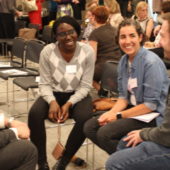Meet Katie Driver, our resident expert on thoughtful leadership, introvert preferences, strengths, profiles and team effectiveness.
Formerly a Senior Civil Service leader, Katie now works across the private, public and charitable sectors in the UK and internationally. She is a certified business coach and Time To Think™ facilitator, a trained Action Learning practitioner and is qualified to use Strengths Profile and Lumina Spark psychometric tools. When not working, Katie can usually be found out running, as she firmly believes that exercise and fresh air are vital for us to do our best thinking.
Integrity is a key value for Katie in all that she does, both inside and outside work.
She said, “In practice, this means that I focus my work on clients who are genuinely trying to change themselves and their organisations for good. I only suggest tools and approaches to them that I’ve tried myself, or believe there’s good evidence for. And I aim to ensure that there’s consistency across what I do in my professional and personal life.”
Katie loves her work, but recognises that everyone needs to have time-out and take a break. If she could change the world, her mission would be to introduce a giant “pause” button which people could press occasionally to catch up on things or have some breathing space.
Not many people know this but, Katie cycled across the United States in 1990 as part of a small group raising money for a Multiple Sclerosis charity. She and her team took six weeks to go from Washington DC to San Francisco – cycling over 3,000 miles and crossing three mountain ranges.
He greatest indulgence is books. She said, “I have more books than I can possibly read in my lifetime and bought another this week (The Testaments by Margaret Atwood) – I guess you could say I’m addicted!”
When asked about her greatest achievement she humbly replied, “Still being here, with a wonderful family, great friends, work I really enjoy and lots still to learn.”









